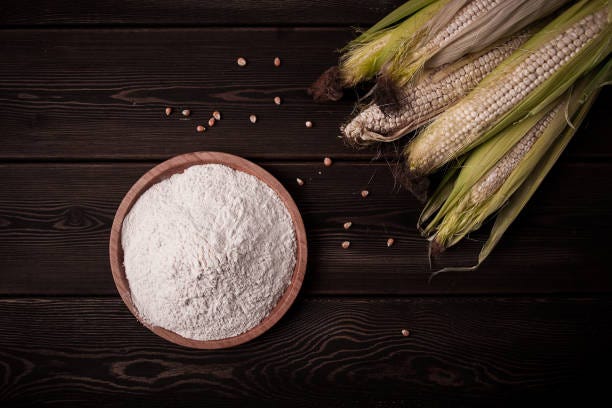In the world of culinary wonders, corn flour is a valued and adaptable ingredient that has long been a mainstay in kitchens all over the globe. This finely ground flour, which is made from corn kernels, is not only an essential ingredient in many recipes but also has several advantages outside of the kitchen. In this thorough tutorial, we’ll delve into the world of corn flour and explore all of its benefits — both practical and health-related.
History of Corn Flour
Let’s first explore the advantages of maize flour before moving on to its history. One of the first crops to be domesticated, maize, often known as maize, has been grown for thousands of years. It is an American native and was a staple food for many prehistoric societies, including the Mayans and Aztecs.
Dried maize kernels are ground into a fine powder to produce corn flour as we know it today. By removing the outer hull and germ, a smooth, adaptable flour that can be utilised in a variety of ways is produced.

Healthy Powerhouse
The outstanding nutritional profile of Corn flour is one of its most important benefits. This gluten-free flour is a beneficial complement to any diet because it is loaded with important nutrients. Among the major nutritional advantages of maize flour are:
1. Carbohydrate-rich
A fantastic source of carbs that gives you an immediate and lasting energy boost is maize flour.
2. Food fibre
It has dietary fibre, which promotes regular bowel movements and helps with digestion.
3. Minerals and vitamins
The health-promoting vitamins and minerals B vitamins, magnesium, and phosphorus are all abundant in corn flour.
4. antioxidants
Antioxidants in this flour work to battle free radicals and lower the risk of chronic illnesses.
Cooking Flexibility
Beyond its nutritional benefits, maize flour is unmatched for its versatility in the kitchen. It is a common ingredient in many different cuisines around the world and the base for many well-loved recipes. These are a few famous examples:
1. Baking
Corn flour is widely used in baking to give cakes, muffins and bread a mild sweetness and a delicate crumb.
2. Thickening Substance
Due to its high starch content, it is a fantastic thickening ingredient for gravies, sauces, and soups.
3. Coatings and Batters
For fried meals like chicken and veggies, corn flour makes coatings that are tasty and crispy.
4. A Gluten-Free Option
Corn flour is an excellent substitute for wheat flour in recipes for people who are sensitive to or allergic to gluten.
Health Advantages
In addition to its culinary applications, maize flour has a number of health advantages that make it an important part of your diet:
1. Weight Control
Corn flour’s fibre encourages a feeling of fullness, which helps with weight management and curbs overeating.
2. Heart Wellness
Corn flour is good for the heart and helps lower cholesterol because it doesn’t contain cholesterol or saturated fats.
3. Digestive Well-being
By reducing constipation and encouraging regular bowel movements, its fibre content contributes to the maintenance of a healthy digestive tract.
4. Skin Care
By thwarting the free radicals that hasten skin ageing, maize flour’s antioxidants support healthy skin.
In Traditional Medicine, Corn Flour
Different cultures have understood the therapeutic benefits of maize flour throughout time. It has been applied as a poultice for wounds and has been used in traditional medicine to treat disorders like digestive problems and skin conditions.
Conclusion
In conclusion, corn flour is a nutritious powerhouse with a host of health advantages and is much more than just a simple culinary staple. Corn flour has played a significant role in our lives from its beginnings in ancient civilizations to its contemporary culinary uses. Consider introducing this adaptable and nourishing flour into your everyday routine whether you want to improve your cookery or your general health. Enjoy the healthful and tasty options that using corn flour opens up for you.
Comments
Post a Comment